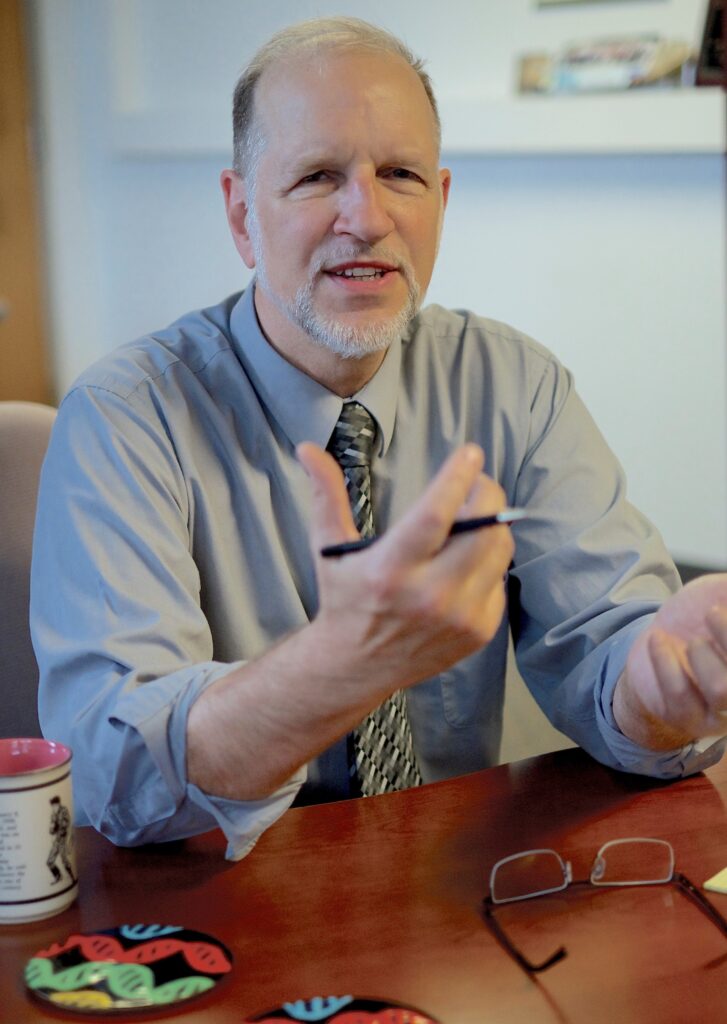
UTHSC: rwilliams@uthsc.edu
Phone
901-604-4752
Imagine if health care providers were to study your DNA sequence, behaviors and lifestyle, then provide personalized advice to prevent disease and prescribe tailored treatments to improve health.
That’s the idea behind “precision medicine.”
“The problem,” said Robert Williams, UT Health Science Center-Oak Ridge National Laboratory Governor’s Chair for Computational Genomics, “is that everyone of us is different and that makes it difficult to predict what suggestions and treatments will work best.”
Williams has spent his career doing research and developing tools for others to use while doing their research, all to “deliver on the promise of precision medicine.”
Williams is the chair of UTHSC’s Department of Genetics, Genomics and Informatics and director of UTHSC’s Center for Integrative and Translational Genomics (CITG). CITG’s mission is to catalyze and support research in human and experimental genetics, and genomics at a statewide level across all colleges.
“CITG also has funded the build-up of our department, and we now have a world-class genetics department at UTHSC,” Williams said.
Williams co-founded and directs the Complex Trait Community, an international group that brings together multidisciplinary scientists—geneticists, bioinformaticians, molecular biologists, statisticians and computer scientists—interested in research on complex polygenic traits and diseases such as diabetes, substance use disorders, and Alzheimer’s disease.
He and colleagues have established GeneNetwork.org, a powerful open-source web service providing linked data sets and tools used to study complex networks of genes, molecules, environments, and phenotypes. GeneNetwork holds more than 40 years of legacy data generated by hundreds of scientists, mainly for many types of mice and rats.
“It’s like having open access to health care records with no strings attached for our rodent resources” Williams said. For researchers, “It’s like finding a huge room full of Lego blocks with which to build models that can predict those best treatments for any specific individual.”
Williams’ expertise is in rodent genetics, work that establishes the foundation for eventual human studies.
He and colleagues use the BXD mice, a “family” of mice that have been genetically inbred to produce a large population of “identical twins”—which helps pinpoint whether something is the result of genetics rather than environment or other factors. Williams has led the way in understanding genetic causes of individual differences and disease risk, as well as how DNA differences interact with factors including diet, aging and the environment.
“Virtually all disease is due to complex interactions between genetic and environmental factors. Our group at UTHSC has developed these novel rodent models of disease to incorporate levels of genetic complexity that mirror human populations. We are using these resources—the BXD family and the Hybrid Rat Diversity Panel—to build and test causal models of disease mechanisms with a special focus on diseases of aging, addiction, and neurological and psychiatric disease.”
Williams has a bachelor’s degree in neuroscience from the University of California, Santa Cruz, and a doctorate in physiology from the University of California, Davis. He did postdoctoral work in developmental neurobiology at Yale and moved to UTHSC in 1989. He was named a Governor’s Chair in 2009.
In 2020, Williams was honored with a UT President’s Award, the highest systemwide honor a UT employee can receive. He was honored in the “Discover” category.
In presenting him the award, UTHSC administrators said, “Dr. Williams has not only advanced UTHSC’s position as a leader in the field of bioinformatics and genetics, he has been a national and international leader in those scientific fields over the past three decades. He is propelling not only UTHSC scientists, but also scientists nationwide and worldwide into the rapidly developing fields of systems genetics and experimental precision medicine.”
When he’s not working, Williams enjoys reading, running and walking, photography, and travel.
